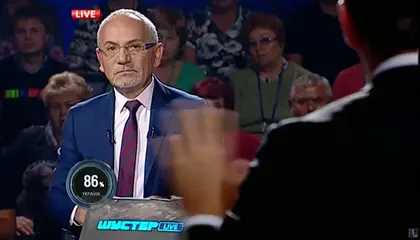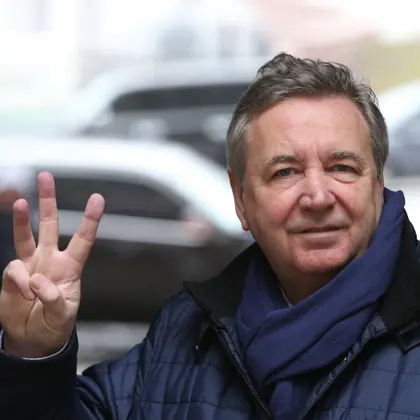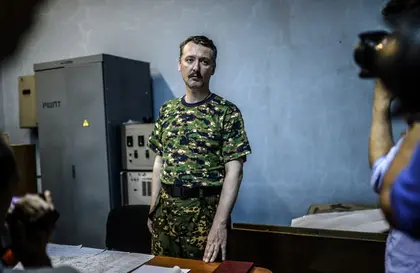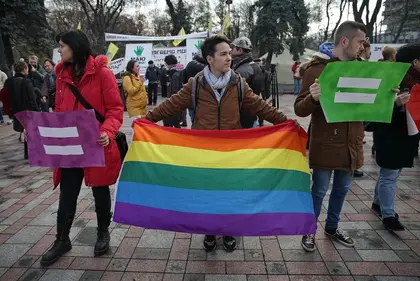The abrupt cancellation of a popular political show by a Ukrainian TV channel has revived concerns that speech is still not as free as it should be in a strong democracy.
The plug was pulled on the Shuster Live political talk show on Channel 1+1 just before it was supposed to start on Sept. 18. Savik Shuster, the show’s host, said he thought he was taken off the air as part of an agreement between the channel’s owner, billionaire oligarch Ihor Kolomoisky, and the Presidential Administration. Shuster said he didn’t know why his show had been cancelled, while President Petro Poroshenko’s spokespeople denied having anything to do with the incident.
“Shuster’s allegations of that the Presidential Administration and the owner of Channel 1+1 agreed to take his show off the air are completely groundless,” the press service of the Presidential Administration told the Kyiv Post.
Meanwhile, the administration of Channel 1+1 released a statement later that night saying that the show would not be broadcast because of the highly “intense” and “politicized” events in the country.
Natalia Ligachova, the head of the media watchdog Telekritika, said the decision to halt the program could well have been taken by the channel’s owner, Kolomoisky.
“I think it was due to the presence of some people there, maybe (leader of the Radical Party Oleh) Lyashko. But not because Kolomoisky doesn’t like (Lyashko), but just to show to the president’s administration that ‘I can stop this scandal being brewed on my channel,’” Ligachova told the Kyiv Post.
Lyashko, one of the schedlued guests on the program, also said he believed that the show was cut off the air because of him — he thinks because of a deal between Poroshenko and Kolomoiskiy. Lyashko had been planning to defend Ihor Mosiychuk, a Radical Party member who was stripped of immunity and arrested on Sept. 17 during a parliament session.
While Ligachova didn’t think the Presidential Administration had asked for the show to be cancelled, she called the whole situation an “unacceptable” regression in free speech.
While the state now hardly ever tries to influence news media coverage, especially in comparison to the 2010-2014 era of ex-Ukrainian President Viktor Yanukovych, the situation remains troublesome when it comes to owners, she said.
“The owners’ censorship is still very strong,” Ligachova said. “Every channel protects the interests of its owner.”
Oksana Romaniuk, the acting head of the Institute of Mass Information, a Ukrainian non-governmental organization, agreed, telling the Kyiv Post that the owners’ grip on their media is so strong that “we can now identify media ownership just by their content.”
“Owners’ censorship is one of the most serious challenges to freedom of speech,” she said. “Earlier, before the EuroMaidan Revolution, we could be talking about pressure from the authorities. Now the situation has become polarized, and the channels cover news according to their owners’ interests. There is no balanced coverage of what is happening. People don’t know about the reforms that are going on, because coverage is biased.”
Media experts say the new law on media ownership transparency, adopted by Ukraine’s parliament and signed by Poroshenko earlier this month, should improve the situation. The law orders media to reveal information about the real structure of their ownership and their end owners. According to Ligachova, it is important for the audience to know who is financing the news they are watching, as it will help them understand better if there is an agenda behind the reporting.

But Olga Chervakova, a member of parliament and the deputy head of the freedom of speech and the informational policy committee of the Verkhovna Rada, told the Kyiv Post that there is no guarantee that the owners will follow the law and “come out of the shadows.”
According to the Media Ownership Project, a media research supported by the Organized Crime and Corruption Reporting Project and Radio Free Europe/Radio Liberty, more than 70 percent of Ukrainian media remain non-transparent.
“They can keep avoiding naming the final beneficiary,” Chervakova said. “They have to pay five percent of the license fee as a fine if they don’t, but if the owner is so odious that he doesn’t want people to know who he is, it’s easier for him to just pay the fine.”

Meanwhile, another incident in mid-September raised questions about government attempts to censor the media – not in Ukraine, but abroad.
The scandal broke out after Ukrainian President Petro Poroshenko on Sept. 16 signed a decree on Ukrainian sanctions against 400 people who were said to represent an “actual or potential threat to national interests, national security, sovereignty and territorial integrity of Ukraine.”
The list included several prominent foreign journalists, including three from the BBC. The resulting furor caused Poroshenko to order the National Security and Defense Council, which had compiled the list, to remove from it the names of six journalists just a day after it was published.
Within an hour, the National Security and Defense Council announced that the three BBC reporters, two Spanish reporters of newspaper El Pais and a reporter for German newspaper Die Zeit would be taken off the list.
There has been no answer yet from the Ukrainian authorities about how and why journalists ended up on Ukraine’s sanctions list, but Ukrainian Minister of Information Policy Yuriy Stets announced on Sept. 17 that the ministry would assemble a group of media experts to analyze and make changes to the list.
At the first meeting of the group on Sept. 21, Stets asked the experts to go through the list and make recommendations within the next few days on which of the remaining 22 journalists should stay on it, and which should be removed. As the Kyiv Post went to press, the experts had yet to issue any such recommendations.
Ligachova, who was invited to the working group meeting, told the Kyiv Post that the authorities “realized that they had messed up, and now they want to show they are doing something good, but they don’t consider the realities,” as it is hardly possible to examine the list properly so quickly.
“There is no separate complete list of journalists, no justification for why they were put on the list in the first place. Was it because they violated journalistic standards, or because they crossed the border illegally?” she asked. “They should have withdrawn the whole list and then worked it all out properly.”
She also said that as Western newsrooms have a very good self-regulation system, the Ukrainian special services should approach media organizations directly if they have concerns about a foreign journalist.
“We should inform western organizations through our channels, and they would take action,” she said.
Roman Holovenko, the head of legal programs at the Institute of Mass Information, who was also present at the working group meeting, told the Kyiv Post that the sanctions list has already damaged the country’s image.
“It wasn’t proofread; there were pseudonyms, it was unclear why some people had been included in the list,” Holovenko said.
He also said that attempting to ban individual journalists, even Russian ones who spread fake news about Ukraine, was the wrong approach – even if the inclusion of some of them on the present list could actually be justified.
“There are such a lot of Russian journalists, they all write with in same way, and if you ban one of them the media can just replace them. The sanctions should be imposed on the (media) companies,” Holovenko said.
Ligachova agreed: “We have to fight not the nuts and bolts of the propaganda system, but those who create and control it.”
Kyiv Post staff writer Alyona Zhuk can be reached at [email protected]
You can also highlight the text and press Ctrl + Enter







Comments (0)